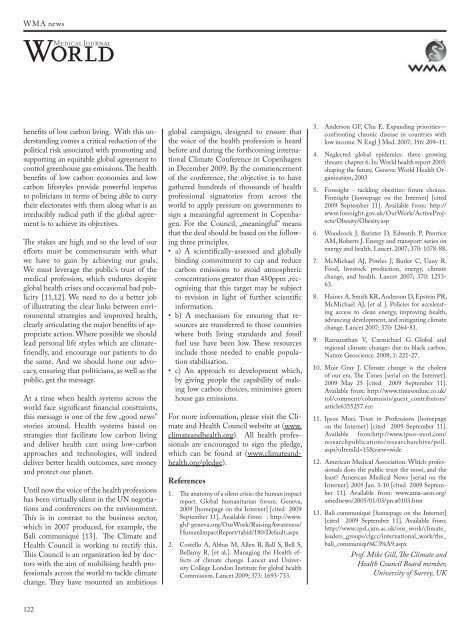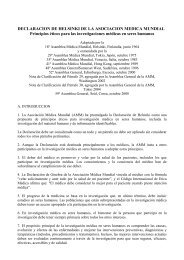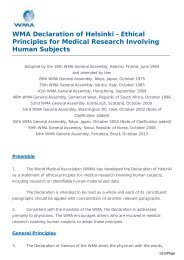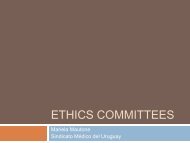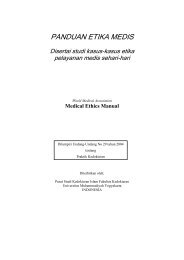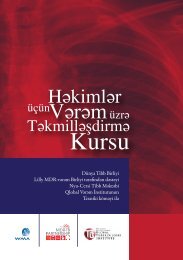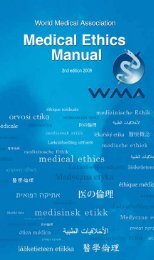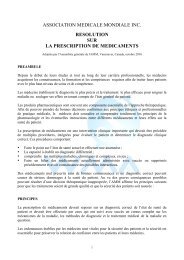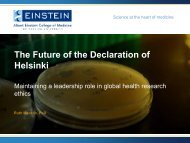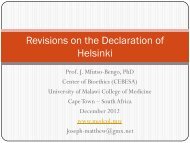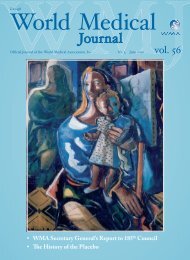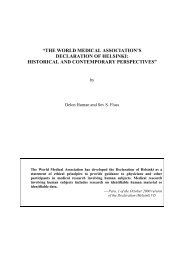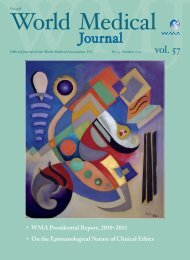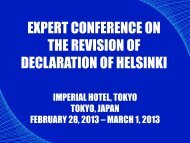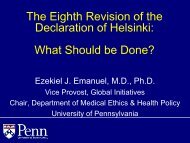wma 7-2.indd - World Medical Association
wma 7-2.indd - World Medical Association
wma 7-2.indd - World Medical Association
Create successful ePaper yourself
Turn your PDF publications into a flip-book with our unique Google optimized e-Paper software.
WMA news<br />
benefits of low carbon living. With this understanding<br />
comes a critical reduction of the<br />
political risk associated with promoting and<br />
supporting an equitable global agreement to<br />
control greenhouse gas emissions. The health<br />
benefits of low carbon economies and low<br />
carbon lifestyles provide powerful impetus<br />
to politicians in terms of being able to carry<br />
their electorates with them along what is an<br />
irreducibly radical path if the global agreement<br />
is to achieve its objectives.<br />
The stakes are high and so the level of our<br />
efforts must be commensurate with what<br />
we have to gain by achieving our goals.<br />
We must leverage the public’s trust of the<br />
medical profession, which endures despite<br />
global health crises and occasional bad publicity<br />
[11,12]. We need to do a better job<br />
of illustrating the clear links between environmental<br />
strategies and improved health,<br />
clearly articulating the major benefits of appropriate<br />
action. Where possible we should<br />
lead personal life styles which are climatefriendly,<br />
and encourage our patients to do<br />
the same. And we should hone our advocacy,<br />
ensuring that politicians, as well as the<br />
public, get the message.<br />
At a time when health systems across the<br />
world face significant financial constraints,<br />
this message is one of the few „good news”<br />
stories around. Health systems based on<br />
strategies that facilitate low carbon living<br />
and deliver health care using low-carbon<br />
approaches and technologies, will indeed<br />
deliver better health outcomes, save money<br />
and protect our planet.<br />
Until now the voice of the health professions<br />
has been virtually silent in the UN negotiations<br />
and conferences on the environment.<br />
This is in contrast to the business sector,<br />
which in 2007 produced, for example, the<br />
Bali communiqué [13]. The Climate and<br />
Health Council is working to rectify this.<br />
This Council is an organization led by doctors<br />
with the aim of mobilising health professionals<br />
across the world to tackle climate<br />
change. They have mounted an ambitious<br />
global campaign, designed to ensure that<br />
the voice of the health profession is heard<br />
before and during the forthcoming international<br />
Climate Conference in Copenhagen<br />
in December 2009. By the commencement<br />
of the conference, the objective is to have<br />
gathered hundreds of thousands of health<br />
professional signatories from across the<br />
world to apply pressure on governments to<br />
sign a meaningful agreement in Copenhagen.<br />
For the Council, „meaningful” means<br />
that the deal should be based on the following<br />
three principles.<br />
• a) A scientifically-assessed and globally<br />
binding commitment to cap and reduce<br />
carbon emissions to avoid atmospheric<br />
concentrations greater than 450ppm ,recognising<br />
that this target may be subject<br />
to revision in light of further scientific<br />
information.<br />
• b) A mechanism for ensuring that resources<br />
are transferred to those countries<br />
where both living standards and fossil<br />
fuel use have been low. These resources<br />
include those needed to enable population<br />
stabilisation.<br />
• c) An approach to development which,<br />
by giving people the capability of making<br />
low carbon choices, minimises green<br />
house gas emissions.<br />
For more information, please visit the Climate<br />
and Health Council website at (www.<br />
climateandhealth.org). All health professionals<br />
are encouraged to sign the pledge,<br />
which can be found at (www.climateandhealth.org/pledge).<br />
References<br />
1. The anatomy of a silent crisis: the human impact<br />
report. Global humanitarian forum. Geneva,<br />
2009 [homepage on the Internet] [cited 2009<br />
September 11]. Available from: : http://www.<br />
ghf-geneva.org/OurWork/RaisingAwareness/<br />
HumanImpactReport/tabid/180/Default.aspx<br />
2. Costello A, Abbas M, Allen B, Ball S, Bell S,<br />
Bellamy R, [et al.]. Managing the Health effects<br />
of climate change. Lancet and University<br />
College London Institute for global health<br />
Commission. Lancet 2009; 373: 1693-733.<br />
3. Anderson GF, Chu E. Expanding priorities—<br />
confronting chronic disease in countries with<br />
low income. N Engl J Med. 2007; 356: 209–11.<br />
4. Neglected global epidemics: three growing<br />
threats: chapter 6. In: <strong>World</strong> health report 2003:<br />
shaping the future. Geneva: <strong>World</strong> Health Organization,<br />
2003<br />
5. Foresight - tackling obesities: future choices.<br />
Foresight [homepage on the Internet] [cited<br />
2009 September 11]. Available from: http://<br />
www.foresight.gov.uk/OurWork/ActiveProjects/Obesity/Obesity.asp<br />
6. Woodcock J, Barister D, Edwards P, Prentice<br />
AM, Roberts J. Energy and transport: series on<br />
energy and health. Lancet. 2007; 370: 1078-88.<br />
7. McMichael AJ, Powles J, Butler C, Uauy R.<br />
Food, livestock production, energy, climate<br />
change, and health. Lancet 2007; 370: 1253-<br />
63.<br />
8. Haines A, Smith KR, Anderson D, Epstein PR,<br />
McMichael AJ, [et al ]. Policies for accelerating<br />
access to clean energy, improving health,<br />
advancing development, and mitigating climate<br />
change. Lancet 2007; 370: 1264-81.<br />
9. Ramanathan V, Carmichael G. Global and<br />
regional climate changes due to black carbon.<br />
Nature Geoscience. 2008; 1: 221-27.<br />
10. Muir Gray J. Climate change is the cholera<br />
of our era. The Times [serial on the Internet].<br />
2009 May 25 [cited 2009 September 11].<br />
Available from: http://www.timesonline.co.uk/<br />
tol/comment/columnists/guest_contributors/<br />
article6355257.ece<br />
11. Ipsos Mori. Trust in Professions [homepage<br />
on the Internet] [cited 2009 September 11].<br />
Available from:http://www.ipsos-mori.com/<br />
researchpublications/researcharchive/poll.<br />
aspx?oItemId=15&view=wide<br />
12. American <strong>Medical</strong> <strong>Association</strong>. Which professionals<br />
does the public trust the most, and the<br />
least? American <strong>Medical</strong> News [serial on the<br />
Internet]. 2005 Jan. 3-10 [cited 2009 September<br />
11]. Available from: www.ama-assn.org/<br />
amednews/2005/01/03/prca0103.htm<br />
13. Bali communiqué [homepage on the Internet]<br />
[cited 2009 September 11]. Available from:<br />
http://www.cpsl.cam.ac.uk/our_work/climate_<br />
leaders_groups/clgcc/international_work/the_<br />
bali_communiqu%C3%A9.aspx<br />
Prof. Mike Gill, The Climate and<br />
Health Council Board member,<br />
University of Surrey, UK<br />
122


